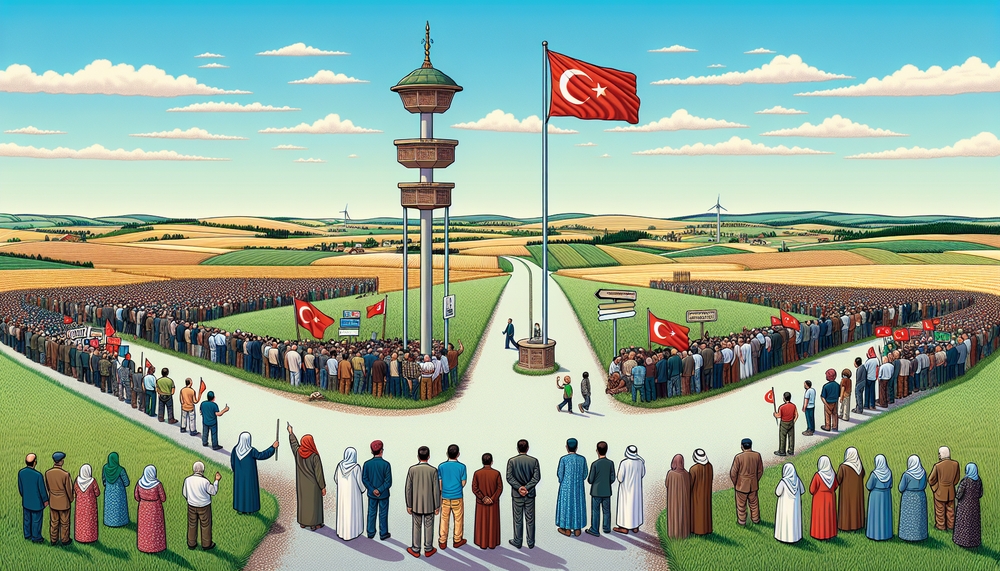Türkiye at the Crossroads: Amplifying Democratic Momentum
Published
- 3 min read

Introduction: Türkiye’s Democratic Struggle
Türkiye’s political landscape stands at a crucial juncture, caught in the throes of a tug-of-war between rising authoritarianism and relentless democratic aspirations. The recent arrest of prominent opposition leader Ekrem İmamoğlu marks a pivotal moment, emblematic of the democratic struggle that defines Türkiye’s current narrative. İmamoğlu’s arrest underscores the intensifying battle against repressive maneuvers and sets the stage for examining potential transformations within the nation’s political framework.
The Deepening Authoritarian Grip
President Recep Tayyip Erdoğan’s strategic consolidation of power has evolved into a refined orchestration of state control, cementing his authority through a blend of repression and strategic alliances. Under Erdoğan’s stewardship, a competitive authoritarian regime has taken root, characterized by the systematic silencing of dissenting voices. This authoritarian grip is keenly felt across media and civil society, with journalists facing detention and media outlets subjected to severe restrictions—a stark departure toward a fully authoritarian system.
International Dynamics: A Paradox of Leverage and Lethargy
Türkiye finds itself in a complex geopolitical puzzle, where its alliances with Western powers yield a paradoxical leverage for President Erdoğan. Despite vocal reproach from the European Union and the United States concerning Türkiye’s democratic backslide, tangible actions remain notably absent. The strategic inertia of these Western allies reflects the multifaceted geopolitical considerations at play, which inadvertently bolsters Erdoğan’s resistive stance against international democratic pressures.
Domestic Institutions Under Control
Erdoğan’s dominance over Türkiye’s institutional landscape is formidable, evidenced by his control over the judiciary, police, and military. These institutions have undergone sweeping reforms characterized by purges and loyalty-based restructures, effectively stifling any dissent. This entrenched control enables the regime’s authoritarian maneuvers to proceed unchallenged, underscoring the severe limitations on Türkiye’s democratic discourse.
Societal Mobilization: A Beacon of Hope
Amidst political repression, societal mobilization emerges as a powerful counterforce. Large-scale public protests have surged as a response to authoritarian advances, illustrating a crucial counterbalance. İmamoğlu continues to stand as a unifying beacon for the opposition, fostering a sense of resilience and unity. These protests not only embody the spirit of resistance within Türkiye but also have the potential to galvanize broader support domestically and internationally.
Potential for Change: Beyond Borders
The ripple effects of Türkiye’s internal mobilizations carry international significance, potentially influencing global perceptions and actions. Western civil society, inspired by Türkiye’s resilient protest movements, may increasingly demand their governments adopt stronger pro-democratic stances. Drawing from Türkiye’s historical commitment to democratic values, these internal struggles could serve as a catalyst for renewed democratic advocacy, reinforcing alliances with like-minded nations dedicated to the cause of democracy.
Conclusion: Toward a Democratic Future
Despite the gravitational pull of authoritarian consolidation, signs of hope endure. The active participation of public voices and ongoing international engagement present a scenario where democratic momentum can potentially outlast repression. Sustaining this momentum entails bolstering societal engagement, nurturing international alliances, and ensuring continued pressure against authoritarian excesses. As Türkiye stands at this crossroads, the pathway to a democratic future rests upon the confluence of determined internal resistance and unwavering global support.
